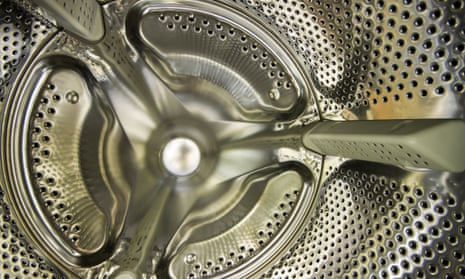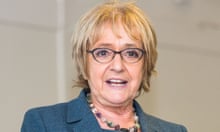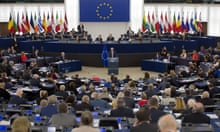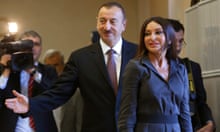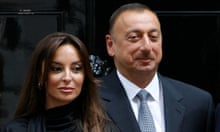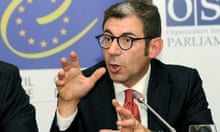What is the Azerbaijani Laundromat?
A scheme to curry influence, pay lobbyists, apologists and European politicians and to launder cash. The $2.9bn (£2.2bn) operation ran between 2012 and 2014 – meaning that on average $3m was channelled out of Azerbaijan every day. The source of money isn’t always clear, but it comes from companies linked to Azerbaijan’s president, Ilham Aliyev, state ministries and the International Bank of Azerbaijan, the country’s largest bank, which recently filed for bankruptcy protection. The cash was transferred into four offshore-managed UK companies. From there, it was spent in various countries, including Germany, the UK, France, Turkey, Iran and Kazakhstan.
How was it done?
By clever use of the west’s financial system. Danske, Denmark’s largest bank, handled the payments via a small branch office in Estonia. It noticed nothing amiss. The organisers of the scheme exploited Britain’s weakly regulated company system. They registered four firms at Companies House in London. These were Hilux Services, Polux Management, Metastar Invest and LCM Alliance. The first two were incorporated in Glasgow, the third in Birmingham and the fourth in Hertfordshire. The beneficial owner of the firms is a secret.
Why Scotland?
Two of the firms used in the Azerbaijani Laundromat were Scottish limited partnerships, known as SLPs. There is evidence that money launderers are using SLPs for international fraud. The companies have all the advantages of a regular firm: they have a “legal personality” and can open bank accounts. They are also entirely non-transparent. If they do their business abroad they don’t have to file returns or pay UK tax. No names of real people appear on the Companies House record. Instead, shadowy offshore agents in the British Virgin Islands “manage” Hilux and Polux.
Is the government doing anything about this?
Yes, belatedly. In June the government brought in new laws forcing SLPs to reveal their real or beneficial owners or pay daily fines of up to £500. The move followed concerns that overseas criminals were piling into SLPs for the purposes of money laundering. According to Transparency International, between 2007 and 2016 the number of SLPs grew more than fourfold. They appear to be part of an offshore criminal network.
Who were the beneficiaries?
Several prominent Europeans. One of them is Luca Volontè, the Italian former chair of the centre-right European People’s party group in the parliamentary assembly of the Council of Europe (Pace). Volontè was among Pace delegates who controversially voted against a 2013 report criticising Azerbaijan’s human rights record. The leaked data shows he received more than €2m (£1.8m). He has been indicted in Italy for money laundering and corruption amid an investigation of what has been dubbed “caviar diplomacy”. He denies wrongdoing.
Other high-profile beneficiaries include Eduard Lintner, a former German MP with the Christian Social Union, the Bavarian sister party to Angela Merkel’s ruling Christian Democrats. Between 2012 and 2014, when he was no longer an MP, his foundation received €819,500. The cash included a €61,000 payment made two weeks after Lintner visited Azerbaijan as an election observer. He praised the poll as up to “German standards”. He says the payments were for legitimate work, and that he did not personally benefit from the money or know about the original source of funds.
Cash was also sent to Bulgarian and Swiss bank accounts belonging to Kalin Mitrev, who was then a private consultant, but now works for the European Bank for Reconstruction and Development in London. Mitrev says the money was private income from legitimate consultancy work and that he was not aware of the original source of the funds. He denies doing anything wrong.
What about Azerbaijanis?
Most of the beneficiaries are from Baku, Azerbaijan’s capital. They include a diplomat at the Azerbaijani embassy in London, Orkhan Sultanov, who has reportedly been named as the country’s foreign intelligence chief, and Jovdat Guliyev, a leading figure in the Anglo-Azerbaijani Society. There is no suggestion they were aware of the original source of the money. There are payments to well-connected regime children studying in Britain or taking English language courses. One of Baku’s most powerful political families is linked to the fund via a French company, RCL Holding. Ziya Mammadov, an ex-transport minister, his son Anar, and other relatives have a multibillion-dollar fortune in Azerbaijan. It includes construction, hotels and insurance companies. The Mammadovs were once investors in Trump Tower in Baku, a development that was never finished. There are payments in the data to entities related to the Mammadovs’ Baghlan Group. The scheme doesn’t link to Trump but does raise questions about the president’s choice of business partners.
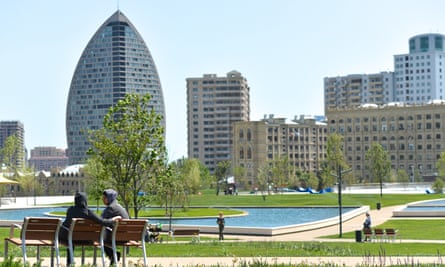
How do we know if this is money laundering?
Danske admits that controls at its Estonian branch to detect and stop money laundering were not good enough. It discovered the scheme in 2014. The bank says it has reported suspicious transactions to the authorities, and it is up to them to determine whether and to what extent these were made for illegal purposes.
Additionally, the suspicious nature of some of the source transactions rings alarm bells. One firm – Baktelekom MMC – paid more than $1.4bn into the bank accounts. The company has the same name as Azerbaijan’s telecoms provider but is unrelated. It makes enormous transfers two or three times a day, with money funnelled back and forth between companies. Offshore experts say this pattern combined with the sheer “velocity” of the transactions should have raised red flags.
Where does the data come from?
An anonymous source leaked the data to the Danish newspaper Berlingske in Copenhagen. The paper shared it with the Organized Crime and Corruption Reporting Project (OCCRP), the Guardian, and other media partners. There are details of more than 16,000 transactions, including names of beneficiaries, bank payment details, and amounts in various currencies.
